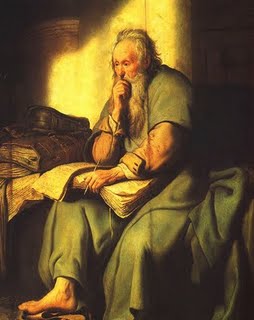
Luke 9:51-56 "When the days were approaching for His ascension, He was determined to go to Jerusalem; 52 and He sent messengers on ahead of Him, and they went and entered a village of the Samaritans to make arrangements for Him. 53 But they did not receive Him, because He was traveling toward Jerusalem. 54 When His disciples James and John saw this, they said, “Lord, do You want us to command fire to come down from heaven and consume them?” 55 But He turned and rebuked them, [and said, “You do not know what kind of spirit you are of; 56 for the Son of Man did not come to destroy men’s lives, but to save them.”] And they went on to another village."
Introduction:
I can recall in my childhood days hearing my parents tell me:
"Mahlon, you are sometimes like a bull in a china closet".
Admittedly, they were more than justified in their assertions. I was (and still can be) strong-willed, stubborn and singular-focused, to a fault. I find it humorous to discover that the Apostle John (and his brother James, known as "James the Son of Zebedee) were together called by Jesus: "sons of thunder". This comical point is highlighted by Mark in Mark 1:37 -
"and James, the son of Zebedee, and John the brother of James (to them He gave the name Boanerges, which means, “Sons of Thunder”)."
John the Apostle was bold by nature. It is hard to imagine the man who loved Jesus with such strength of grace and courage in his latter years was the sort of man you would rather had avoided in his youth. Yet, as is often the case with all new converts to Christ, the process of sanding off the rough edges must begin with the rough edges. Amazingly, what are often liabilities in our personalities are transfigured into benefits for the Kingdom.
In today's post, we once again take a look at the Apostle John to understand how we can better love the Lord Jesus Christ. We saw last time that, like John, we too must begin this journey of love by following Jesus (for the previous post, click here: http://www.growingchristianresources.com/2018/06/p1-biographical-sketch-of-apostle-john.html ).
In today's post, we will add on a second trait: fervency for Jesus.
John's fervency to follow Jesus
Luke 9:51-56 records an episode where Jesus was transitioning his ministry from primarily focusing upon Galilee to the North to gradual priority upon Judea and Jerusalem to the South. In Luke's version, stretching from chapters 10-17, we find unique material devoted to Jesus' ministry in Perea along the Western side of the Jordon River. Jesus and his disciples were looking to lodge in Samaria for the night before continuing their journeys (see map below):

As Luke's narrative reports, Jesus sent a couple of his disciples to inquire about lodging. Their request was denied due to the animosities between the Samaritans and the Jews. As a historian, Luke then reports the responses of the disciples, especially a then young apostle John. As a "son of thunder", John makes the astonishing suggestion in Luke 9:54 -
"When His disciples James and John saw this, they said, “Lord, do You want us to command fire to come down from heaven and consume them?”
Wow! One would think that the man "whom Jesus loved" would never had made such a radical suggestion. John expressed untampered zeal. Yet, John did. How many of us, in our Christian walks, have made those impetuous choices or inserted our foot in the mouth? John's statement is met with a rebuke from Jesus, reminding him in Luke 9:55-56 -
"But He turned and rebuked them, [and said, “You do not know what kind of spirit you are of; 56 for the Son of Man did not come to destroy men’s lives, but to save them.”] And they went on to another village."
A.B. Bruce's classic study on the disciples: "The Training Of The Twelve", page 234, give the following insight:
"It shows how slow the best are to learn the heavenly doctrine and practice of charity. How startling, again, to think of the same John, a year or two after the date of this savage suggestion, going down from Jerusalem and preaching the Gospel of Jesus the crucified in 'many of the villages of the Samaritans', possibly in this very village which he desired to see destroyed!"
Bruce's reference to John's change of heart is found in Acts 8:14-17 -
"Now when the apostles in Jerusalem heard that Samaria had received the word of God, they sent them Peter and John, 15 who came down and prayed for them that they might receive the Holy Spirit. 16 For He had not yet fallen upon any of them; they had simply been baptized in the name of the Lord Jesus. 17 Then they began laying their hands on them, and they were receiving the Holy Spirit."
John's fervent temperament spilled-over in those early days of his conversion. In the hands of Jesus, John's fervency in the flesh was ever-slowly transformed into a fervency of love for Him. For sure, John and his brother both exhibited strong passion in their life. At one point in their journey's with Jesus, they request of Jesus to sit at his right and left hand in the kingdom (compare Mark 10:35-40). Jesus tells them that they are ignorant of the manner of their request, and warns them of the possible implications (namely, martyrdom). John and James both assert they're able to take whatever consequences, if it will mean the granting of their request.
We may look at John's behavior and cast a swift verdict. However, how many times have any of us, even after walking with the Lord for many years, who name "the name of Christ", gotten wobbly, excessive or out-of-turn? Thankfully, the Lord Jesus Christ is merciful. Patient.
Like all Christians, John bore the left-over remnants of the old nature. Like rust on a car, the fragments of that old way of thinking clung to the newly regenerated nature. Excesses are traced to the flesh - or "old man" (see Colossians 2-3). John had his boxing ring, set in the heart, with the new nature duking-it-out with his old-ways. Still, the fervor characterizing John's temperament became useful in Jesus' hands.
Fervency of the flesh gradually gives way to fervent love for Jesus
Whenever we look at John's progression in discipleship, we witness transformation. The fervency of the flesh is slowly melting away to the fervency of God's love coursing through his heart. The scenes of John with Peter and James upon the Mount of Transfiguration gives us a glimpse into the beginnings of such changes (see Matthew 17; 2 Peter 1:16-21). While Peter is peppering Jesus with frantic questions and excitement, we hear not a word from John's lips (compare Matthew 17:1-13).
Or consider how few of words he is at the final meal between Jesus and his disciples in John 13:22-25. It is at this juncture that we find John reclined on Jesus. The practice of leaning on one another at an oriental meal, on the ground, would explain why John was pressed in on Jesus' side. Once Jesus reveals that He is going to undergo betrayal, John (described in John 13:23 as "the one whom Jesus loved) asks Jesus in 13:25 - "Lord, who is it?" John's listening and watching of the Master takes over those earlier episodes where he would boldly stride in like the proverbial "bull in a china-closet".
John's fervency is reined in by an ever-increasing Christ-like humility. The forging together of fervency and humility yields that Biblical alloy of meekness (compare Moses in Numbers 12:3, KJV). By the time we arrive at the foot of the cross in John 19:25-27, we see the fervency of love most poignantly displayed:
"Therefore the soldiers did these things.
But standing by the cross of Jesus were His mother, and His mother’s sister, Mary the wife of Clopas, and Mary Magdalene. 26 When Jesus then saw His mother, and the disciple whom He loved standing nearby, He said to His mother, “Woman, behold, your son!” 27 Then He said to the disciple, “Behold, your mother!” From that hour the disciple took her into his own household."
But standing by the cross of Jesus were His mother, and His mother’s sister, Mary the wife of Clopas, and Mary Magdalene. 26 When Jesus then saw His mother, and the disciple whom He loved standing nearby, He said to His mother, “Woman, behold, your son!” 27 Then He said to the disciple, “Behold, your mother!” From that hour the disciple took her into his own household."
John's fervent love for Jesus grew despite the pressures and persecutions
John's place at the foot of the cross, beside Jesus' mother according to the flesh, befits this disciple as the man par excellence in matters pertaining to love for Jesus. Jesus knew John was the only one able and willing to care for Mary. None of Jesus' half-brothers per the flesh were given this privilege (besides the fact they were not-yet-followers of Jesus as Messiah). John's fervency of love for His Lord is observed by being the first disciple to reach the empty tomb. John would express faith (albeit, the beginnings of such), that Jesus had risen (John 20:6,8). John was there with the other 120, awaiting for the promise of the Spirit spoken of by Jesus (Acts 1:13).
It was this same John that partnered with Peter in launching out the initial apostolic mission in and around Jerusalem and Judea (see Acts 3:1,3,4,11; 4:13,19; 8:14). John's brother, James, was martyred for his faith in Christ, echoing the fervent love of his brother (Acts 12:12). John's fervent love was so much so that he was known in the early church as a "pillar" of the church (compare Paul's remarks in Galatians 2:9).
Closing thoughts and applications: fervent love, expressed in John's writings
By the time John reaches his mid-eighties, he has already followed Jesus with fervent love for some 50-60 years. The three epistles that bear this include this term "love" 26x in 1 John, 4x in 2 John and 3 times in 3 John. John's Gospel, penned very shortly before or at the same time as his little letters, mentions love from Christ or towards Christ nearly 40x. The final book John would pen under the inspiration of the Holy Spirit, his Apocalypse or Revelation, mentions such fervent love as central to Christian living. Revelation 12:11 states -
"And they overcame him because of the blood of the Lamb and because of the word of their testimony, and they did not love their life even when faced with death."
John's fervent love is deeper, higher and wider for Jesus as he pens that glorious book of Revelation on that small Island of Patmos. Life got harsher for this apostle. Yet, the love of Jesus grew only sweeter. Can the same be said of you and me, dear reader. Loving Jesus certainly begins with following Him. However, the fervor of love for Him ought to grow all the more sweeter. Might we consider John's example and by the power of the Spirit, love the Lord Jesus with such fervent love.



